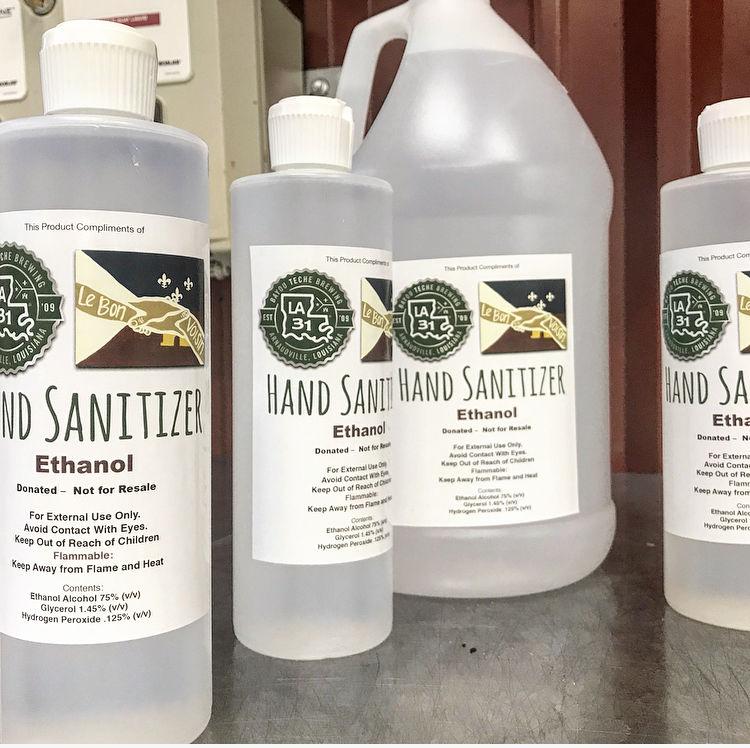By David Jacobs | The Center Square
Since food and beverage companies are considered essential, Bayou Teche Brewing in Arnaudville is allowed to stay open during the COVID-19 pandemic, although sales are down by more than 50 percent.
While hoping for better times, the craft beer maker is producing a new product that’s in even more demand: hand sanitizer.
Normally, a brewery isn’t allowed to handle high-alcohol spirits, Bayou Teche owner Karlos Knott said. With an emergency waiver from the federal government and some spirits from a nearby distillery, however, the company is cranking out 12-ounce “longnecks” of ethanol-based sanitizer to be distributed for free by local charity Le Bon Voisin, which means “the good neighbor” in Cajun French.
While Knott is happy to pitch in, his small business is struggling, and craft beer industry advocates said the state’s legal restrictions are making survival more difficult than it needs to be.
Tap room sales, now limited to pickup only, are about 1 percent of what they had been. Although some breweries have onsite restaurants, they’re not allowed to sell food to go under state law, Knott said, so they don’t have the lifeline traditional restaurants have had since their dining rooms were shut down by state order.
Other sales are down about 50 percent, Knott said, which is in large part attributable to bars being shut down.
“I think just about everybody’s laid off quite a few of their employees, if not all of them,” said Knott, who also is president of the Louisiana Craft Brewers Guild.
By law, Louisiana beer makers cannot sell directly to retailers. Though wholesalers will disagree, craft beer brewers said the strict, tiered system favors big macro brewers that have more clout with distributors. They point to states such as Texas, which lets smaller brewers sell directly to stores.
Forcing their product to go through more hands isn’t the safest practice right now, said Cary Koch, the craft beer guild’s executive director. In some cases, the public health crisis has led to challenges in the supply chain, he said.
Knott loves his distributors, he said, but some are more reliable than others.
“Some of them are more interested in selling other things besides local beer,” he said.
Louisiana lawmakers last year legalized alcohol delivery, helpful at a time when most consumers are limiting their trips to the store, but the law cuts out most third-party food and beverage delivery companies by not allowing contract workers to make alcohol deliveries. As of a few weeks ago, there had been only 55 alcohol delivery permits issued statewide, Koch said.
“If I’m able to brew this, and I can get it to someone who wants it, then let me go do it,” he said.
Direct distribution, theoretically, would allow Louisiana brewers to cut out the middleman. But Knott said loosening the state’s franchise laws, which he said make it nearly impossible to get out of a distribution contract, also could help by creating more competition.
Distributors said they put significant time and money into building their craft beer brands, so the contracts should be hard to dissolve. They said the tiered system protects public health, in part by keeping out black market alcohol, and has safeguards to ensure a competitive market. Partnering with an established distributor gives craft brewers more market access than they otherwise would have, supporters of the tiered system said.
There are other legal changes advocates said might help put Louisiana’s small craft brewing sector on a more even playing field with their out-of-state competition. Knott said some states allow beer makers to transfer their beer between multiple facilities. But in Louisiana, you can’t brew beer in one location and sell it at a second brewery, he said.
“We would like to be able to sell all of our beer at all of our facilities,” Knott said.
At one time, some Louisiana breweries were renting out their grounds for public events. They still can, or at least they will be able to once large events are allowed again, but Knott said a recent change in the law means only their onsite beer can be served, which has killed much of their wedding and corporate business.
“Some of our breweries built giant reception rooms when it was legal to have outside alcohol,” Knott said. “Now those assets are just kind of sitting idle.”
Knott said a bill tweaking the public-events rules was filed for this year’s session. Bills that would allow contractors to deliver alcohol currently don’t include letting brewers deliver, Koch said; that change would require changing the state’s general distribution laws.
Since this year’s regular session was suspended because of the COVID-19 outbreak, it is unclear whether lawmakers will have time to discuss anything beyond a limited number of must-pass bills.
“I think this is making a lot of small businesses rethink how they do what they do,” Koch said. “If we’re faced with something like this again, how would we survive?”

